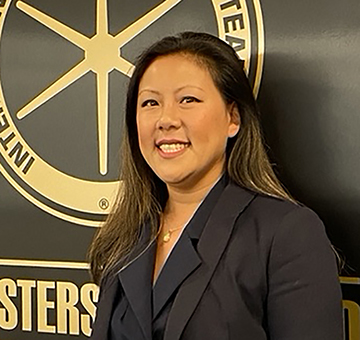California Teamsters take on Sacramento to call for end to worker misclassification
April 3, 2019Teamsters from more than 15 local unions within California Joint Councils 7 and 42 took part in a hearing and lobby day in Sacramento in support of legislation to help end misclassification. The Lobby Day was sponsored by the California Labor Federation.
In April, the California Supreme Court’s landmark decision in Dynamex Operations West, Inc. vs Superior Court of Los Angeles, referred to as “Dynamex,” simplified the test for determining whether a worker is classified as an employee for minimum wage and overtime protections. Assembly Bill (AB) 5 is legislation that would codify Dynamex into state law, and make it harder for employers to misclassify their employees as independent contractors.
“Misclassification is an attempt to weaken the bargaining power of workers. Unchecked, it will contribute to ever-widening income inequality and increased corporate power,” said Doug Bloch, Political Director for Teamsters Joint Council 7.
Bloch was a panelist on the California Assembly Committee on Labor and Employment hearing titled, “Dynamex and Beyond: Understanding the Legal and Policy Landscape of Workers Misclassification in California.”
He noted that good employers who play by the rules should not be undercut by companies that misclassify their workers as independent contractors to avoid the minimum wage, payroll taxes, Social Security, unemployment insurance, workers’ compensation and more.
“We urge the passage of AB 5 to help protect and rebuild this state’s middle class,” Bloch said.
Assembly Labor – Dynamex Informational Hearing
Testimony before Assembly Committee on Labor and Employment by Political Director Doug Bloch
My name is Doug Bloch, and I am proud to represent over 225,000 Teamsters in California.
I want to take you back to 1964 and a milestone in American labor history.
That’s when Teamsters General President Jimmy Hoffa signed the first National Master Freight Agreement, uniting over 450,000 truck drivers under one contract. The agreement provided living wages, benefits, on-the-job protections and retirement security for generations of workers.
That is what is at stake here today. The choices we make here will determine whether future generations of workers enjoy the same.
Hoffa understood that as employers got more organized on the national level, workers needed to organize so they could have equal power. But, under relentless pressure from the business community, in 1980, the federal government deregulated trucking.
At that time, the National Master Freight Agreement covered 19,000 companies and 90% of the industry was unionized. In the first five years, almost 7,000 companies went bankrupt. Within ten years, nearly 500,000 Teamsters lost their jobs.
Today, we only have two companies and 75,000 workers left under the National Master Freight Agreement.
What happened?
Two words: independent contracting.
Out of the ashes of deregulation, this business model came to dominate trucking, leading to a reduction in worker power, wages, and the decline of a once-middle class occupation. Deregulation has been wildly successful for business, allowing large companies to pay much less to move goods.
Those cost savings have come from a race to the bottom as companies cut wages—almost 50% since deregulation. Now driving a truck has been described for many as a “sweatshop on wheels.” Drivers work 60-100 hours per week and make less than minimum wage after their expenses. They have no worker’s comp and no benefits.
It’s shifted the cost of buying, operating, and maintaining trucks onto the backs of those least equipped to do it. This compromises our ability to meet our climate goals as drivers cannot afford to buy clean trucks.
Drivers have little recourse to do anything as independent contractors. As small businesses under the law, they cannot organize a union.
I am proud to say that California has done more to address the misclassification of truck drivers than any other state in the country.
Since 2011, port truck drivers have filed at least 1,000 claims with the Labor Commissioner. Almost half of those have led to determinations that drivers were, in fact, employees and therefore owed over $50 million in stolen wages and penalties.
The Dynamex ruling was against a package delivery company that competes directly with our largest employer, UPS.
At UPS a worker with a high school education – even if they have a criminal background – can make $75,000 a year, fully paid family health insurance, and retire with a pension.
UPS posted a $1 billion profit last year, showing that a company can make money and treat their workers right. UPS and other good employers should not be undermined by the choices this body makes.
Misclassification is an attempt to weaken the bargaining power of workers. Unchecked, it will contribute to ever widening income inequality and increased corporate power.
Therefore, we urge the passage of AB5 to help protect and rebuild this state’s middle class.

